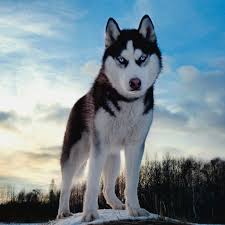
Siberian Husky
Conditions of detention
Siberian Huskies thrive in environments where they have plenty of space to roam and exercise. They are best suited for homes with large yards or access to open areas and do well in both urban and suburban environments if their exercise needs are met.
Useful Fact: Due to their high energy levels and need for physical activity, Siberian Huskies are not ideal for apartment living unless they receive ample exercise.
Nutrition and diet
A balanced diet rich in high-quality proteins, fats, and essential nutrients is crucial for the Siberian Husky. Their diet should support their active lifestyle and maintain their overall health.
Useful Fact: Monitoring portion sizes and providing a diet appropriate for their age, weight, and activity level helps prevent obesity and maintain optimal health.
Health
Siberian Huskies are generally healthy dogs with a lifespan of 12-14 years. However, they can be prone to specific conditions such as hip dysplasia, cataracts, and progressive retinal atrophy (PRA).
Useful Fact: Regular veterinary check-ups and being aware of breed-specific health issues can help manage and prevent potential problems.
Grooming and care
Siberian Huskies have a dense double coat consisting of a soft undercoat and a thicker outer coat. They shed heavily twice a year, known as “blowing coat,” during which more frequent brushing is needed.
Useful Fact: Regular brushing, at least once a week, helps remove loose hair and keep their coat healthy. During shedding seasons, more frequent brushing may be necessary.
Education and training
Siberian Huskies are intelligent but can be independent and strong-willed. Consistent, positive reinforcement methods work best for training.
Useful Fact: Early socialization and obedience training are crucial to develop good behavior and ensure they are well-adjusted adults. Huskies can be escape artists, so secure fencing is important.
Toys and entertainment
Interactive toys, puzzle games, and activities that stimulate both their mind and body are ideal for keeping a Siberian Husky entertained.
Useful Fact: Huskies enjoy activities that challenge their natural instincts, such as pulling sleds, hiking, and agility training.
Safety
Ensure your home and yard are secure, as Siberian Huskies have a strong prey drive and may wander if they catch an interesting scent.
Useful Fact: Microchipping your Siberian Husky can help ensure their safe return if they ever get lost.
Accessories
Sturdy collars, harnesses, and leashes are necessary for daily walks. Grooming tools like brushes and combs are also essential.
Useful Fact: High-quality, durable chew toys can help maintain their dental health and provide mental stimulation.
Socialization
Early and regular socialization with other dogs, animals, and people is crucial for a well-rounded Siberian Husky. This helps in developing a friendly and confident demeanor.
Useful Fact: Puppy classes and regular playdates with other dogs can enhance their social skills and reduce shyness or aggression.
Travel and Transportation
Siberian Huskies adapt well to travel, but ensuring they are comfortable and secure in a car or crate is important for safety.
Useful Fact: Gradual introduction to car rides and providing familiar toys or blankets can ease travel anxiety.
Behavior and psychology
Siberian Huskies are known for their friendly, outgoing, and energetic nature. They thrive on companionship and mental stimulation, making them loyal and engaging pets.
Useful Fact: Mental exercises, such as learning new tricks, can prevent boredom and associated behavioral issues. Huskies are known for their vocalizations and may “talk” to their owners.
Legal aspects
Owning a Siberian Husky may require specific licenses or adherence to local regulations regarding pet ownership. Ensure your dog is registered and vaccinated according to local laws.
Useful Fact: Familiarize yourself with breed-specific legislation in your area to avoid any legal complications.


